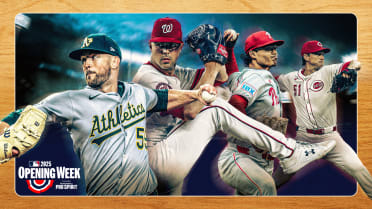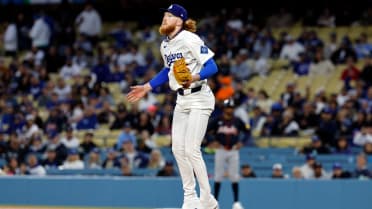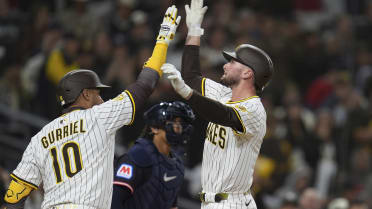TEMPE, Ariz. -- Back in the 1970s, the Los Angeles/Anaheim chapter of the Baseball Writers' Association of America held its annual banquet on the night before the Freeway Series, which signaled the end of Spring Training.
The event was always held at a hotel in Los Angeles. Dodgers players weren't about to make the drive to Orange County, home of the Angels, even though many of them lived there -- including Hall of Fame manager Tommy Lasorda.
They weren't about to accept anything that might be construed as second-class citizenship in the Southern California baseball world.
The players barely said hello to each other. That's how baseball was back then, and not just in Southern California.
Mike Caldwell was traded from the Reds to the Brewers on June 15, 1977. Upon joining his new team, Caldwell reportedly called a team meeting at which he announced, "There are only 24 players in this game I like. … And if I ever get traded from here, I'll hate every one of you, too."
Oh, how the game has changed.
There is still competiveness when the game begins, but that hard line of Us vs. Them has softened, if not totally disappeared.
As the Dodgers' bus unloaded at Tempe Diablo Field for Wednesday's game between the Angels and Dodgers, the Dodgers entered the field through the gate in right field, and on their way to the visiting dugout on the third-base side, they stopped to shake hands and exchange pleasantries with Angels players.
"In the fans' mind, it is more of a rivalry than with the players," said Angels first baseman Albert Pujols. "When you cross the line and the first pitch is thrown, you try to win, but during stretching and batting practice? Well, I'm good friends with [Clayton] Kershaw and other guys over there.
"The game is the game. You build up relationships. I still have friends in St. Louis."
Hal McRae became the hitting coach of the Phillies in 1995, and when Colorado visited Philadelphia for a series, Rockies manager Don Baylor's name was mentioned. McRae said he had never met him.
But they were both African-Americans who came up through the Minor Leagues in the 1960s. They both were premier DHs in the American League. And they both managed in the big leagues -- McRae with the Royals at that time, and Baylor with the Rockies.
"But," McRae said, "we were never teammates. Why would we have ever talked?"
The story was relayed to Baylor.
"He's right," said Baylor. "You respected the way a guy played, but why would you think you were going to be friends? They were trying to take food off your table. They were trying to beat you."
How serious was that attitude back then? When Baylor managed the Rockies, he would occasionally be asked to do a pregame interview for the opponent's telecast.
"Where do you want to do it?" he would ask.
"By the [opposing team] dugout," the TV-type would say.
"No thanks," said Baylor. "I don't go to that side of the field."
During batting practice, Baylor never even stood on the side of the batting cage closest to the other team.
Angels manager Mike Scisocia remembers those times.
"There's no doubt the attitude has changed," said Scioscia.
During the 2013 season, Esmil Rogers of the Blue Jays pitched six dominant innings in a victory against the Rockies, the team that originally signed him. The next day, while Colorado's players were stretching on the field in front of the visiting dugout at Rogers Centre, Rogers strolled through the Rockies' players as they exercised, exchanging barbs about how well he pitched.
"Those are his buddies," a member of the media said. "He came up with them in the Rockies' organization."
An older media type raised his eyebrows.
"He embarrassed them last night, and now they are telling jokes," he said, shaking his head.
Yes, the game has changed.
No longer does Major League Baseball require an umpire to be at the ballpark before any players are on the field working out during the afternoon of the game to make sure there is no fraternization between teams. If players from the two teams were seen chatting, a memo would be sent to the league office in New York, and a fine would be levied.
But then the game has changed dramatically, especially in terms of finances, and Pujols thinks that could well be a factor.
"Back in those days, guys had to battle for jobs," he said. "With expansion and all the additional teams, there are more job opportunities, and there are guaranteed contracts. It might make a difference."
And that makes a lot of sense.
Tracy Ringolsby is a columnist for MLB.com.



